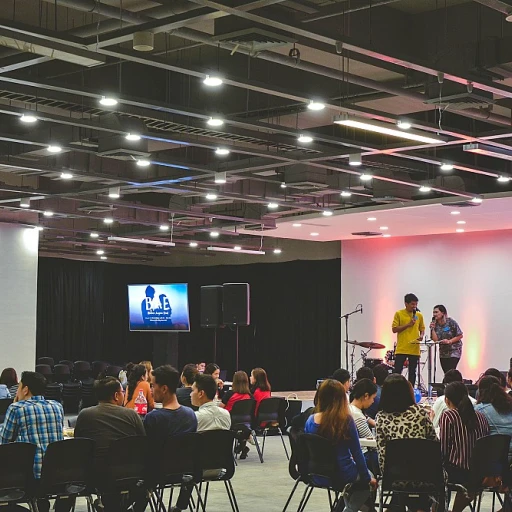
Understanding pre-hire solutions in retail and hospitality
Why Pre-Hire Solutions Matter in Retail and Hospitality
Retail and hospitality are fast-paced industries where the quality of hiring decisions directly impacts customer service, brand reputation, and business outcomes. With high turnover rates and seasonal fluctuations, companies need robust pre-hire solutions to identify the best talent efficiently. The right approach to screening and assessing candidates can make a significant difference in the recruitment process, especially when hiring for roles that demand strong interpersonal skills and adaptability.
What Makes Pre-Hire Solutions Unique in These Industries?
Unlike other sectors, retail and hospitality staffing often involves high-volume recruitment, urgent time-to-hire needs, and a focus on candidate experience. Hospitality recruitment, for example, must balance speed with quality to ensure that new hires can deliver excellent customer service from day one. Retail hiring managers face similar challenges, needing to fill positions quickly while maintaining a consistent employer brand.
- Volume and speed: High applicant numbers require efficient applicant tracking and screening solutions.
- Candidate experience: A smooth process helps attract top talent and supports long-term retention.
- Role diversity: From front-line hospitality workers to retail management, each job demands tailored assessment methods.
Key Elements of Effective Pre-Hire Solutions
To optimize the hiring process, businesses in the retail hospitality sector are turning to a mix of technology and human insight. Video interviews, automated screening, and data-driven talent solutions are becoming standard. These tools not only speed up the recruitment process but also help hiring managers make more informed decisions. Partnering with a staffing agency or using specialized staffing solutions can further streamline the process and improve the quality of hires.
For organizations aiming to build a strong employer brand and deliver a positive candidate experience, crafting impartial hiring letters is a crucial step. Learn more about fair recruitment practices and how they contribute to effective talent acquisition in the hospitality industry.
Key challenges in hiring for retail and hospitality
Unique Staffing Hurdles in Retail and Hospitality
The retail and hospitality industries face some of the toughest recruitment challenges. High turnover rates, seasonal peaks, and the constant demand for customer service excellence make hiring a complex process. Employers must fill roles quickly, but also ensure candidates are the right fit for the job and the brand. This balancing act puts pressure on hiring managers and staffing agencies to find effective solutions.
- Volume and Speed: Retail and hospitality staffing often involves hiring large numbers of candidates in a short time. The need for speed can sometimes compromise the quality of the recruitment process.
- Candidate Experience: A smooth and engaging candidate experience is crucial. Poor communication or lengthy application processes can deter top talent, impacting the employer brand.
- Screening and Assessment: Identifying candidates with the right mix of skills, attitude, and cultural fit is challenging, especially when screening hundreds of applications for customer-facing roles.
- Retention and Long-Term Fit: Many hospitality workers and retail staff leave within the first year. Ensuring a good match during the pre-hire stage is key to reducing turnover and improving long-term business outcomes.
- Compliance and Diversity: The recruitment process must meet legal requirements and support diversity goals, adding another layer of complexity for hiring managers.
These challenges highlight the need for robust talent solutions and innovative staffing solutions. Integrating data-driven approaches, such as pre-hire assessments and video interviews, can help streamline the process and improve outcomes. For more insights on leveraging analytics to enhance your recruitment process, explore how analytics can optimize your RFP and talent acquisition strategies.
The role of HR analytics in pre-hire processes
How analytics shape smarter hiring decisions
Retail and hospitality businesses face intense competition for top talent. The hiring process is often fast-paced, with high volumes of candidates and a constant need to fill roles quickly. Human resources analytics has become a game changer in this environment, helping organizations make more informed decisions and improve both efficiency and candidate experience.
- Screening and shortlisting: Analytics tools can quickly analyze large pools of applicants, identifying those who best match the job requirements. This reduces manual effort and helps hiring managers focus on the most promising candidates.
- Predicting candidate success: By examining historical data on previous hires, analytics can highlight which candidate profiles are most likely to succeed in specific roles. This is especially valuable in customer service and hospitality staffing, where soft skills and cultural fit are critical.
- Reducing time to hire: Data-driven insights streamline the recruitment process, from initial screening to final selection. This not only speeds up hiring but also improves the overall candidate experience by minimizing delays.
- Enhancing employer brand: Consistent, fair, and transparent hiring practices—supported by analytics—help build a positive reputation among job seekers. This is crucial in the hospitality industry, where word-of-mouth and online reviews can impact talent acquisition.
Many organizations in retail hospitality are now leveraging solutions like applicant tracking systems, video interviews, and advanced screening tools. These technologies collect valuable data at every stage of the recruitment process, enabling continuous improvement and better staffing solutions.
For hiring managers and staffing agencies, analytics also provide insights into bottlenecks in the process, helping to optimize workflows and allocate resources more effectively. This leads to long-term improvements in both recruitment outcomes and business performance.
Curious about optimizing your interview scheduling for a better candidate experience? Check out this guide on scheduling interviews back-to-back for practical tips.
Popular pre-hire assessment tools and methods
Assessment Tools Shaping Retail and Hospitality Recruitment
In the fast-paced retail and hospitality industry, hiring managers need reliable ways to identify top talent quickly. Pre-hire assessment tools and methods have become essential for screening candidates efficiently and improving the overall recruitment process. These solutions help employers make informed decisions, reduce time to hire, and enhance the candidate experience.- Structured Interviews and Video Interviews: Video interviews allow recruiters to assess communication skills and customer service aptitude, which are critical for hospitality workers and retail roles. Structured interviews, often supported by digital platforms, ensure consistency and fairness in the hiring process.
- Situational Judgment Tests (SJTs): SJTs present candidates with realistic job scenarios, measuring their problem-solving abilities and alignment with company values. This method is particularly effective for roles requiring quick thinking and adaptability, such as front-line hospitality staffing.
- Personality and Behavioral Assessments: These tools evaluate traits like teamwork, resilience, and customer orientation. They help predict long-term job fit and support talent acquisition strategies focused on building strong employer brands.
- Skills and Aptitude Tests: For both retail and hospitality recruitment, skills assessments verify candidates’ abilities in areas like sales, language proficiency, or technical knowledge. This ensures that new hires can deliver the best customer service from day one.
- Applicant Tracking Systems (ATS): Modern ATS platforms streamline the recruitment process by automating screening, scheduling, and communication. They also provide valuable data for ongoing improvement of staffing solutions.
Best Practices for Implementing Pre-Hire Solutions
To get the most from pre-hire assessments, organizations in the hospitality industry and retail sector should:- Choose tools that align with specific job requirements and business goals.
- Integrate assessments seamlessly into the recruitment process to avoid delays and maintain a positive candidate experience.
- Regularly review assessment data to refine hiring strategies and ensure fairness.
- Collaborate with staffing agencies or talent solutions providers for industry-specific expertise.
Integrating data-driven insights into recruitment strategies
Bringing Data into Everyday Recruitment Decisions
Integrating data-driven insights into recruitment strategies is transforming how retail and hospitality businesses approach hiring. With the fast-paced nature of these industries, hiring managers and staffing agencies need solutions that streamline the process and improve candidate experience. Leveraging analytics helps identify the best talent for customer service roles, reduce time to hire, and enhance the overall recruitment process.
- Applicant Tracking Systems (ATS): Modern ATS platforms collect and analyze candidate data, making it easier to screen applicants and track their progress. This supports hiring managers in making informed decisions and maintaining a strong employer brand.
- Pre-hire Assessment Data: By analyzing results from skills tests, video interviews, and personality assessments, recruiters can match candidates to roles that fit their strengths, improving long-term retention in both retail and hospitality staffing.
- Recruitment Metrics: Metrics such as time to hire, candidate drop-off rates, and source of hire provide valuable insights. These data points help optimize the recruitment process and highlight areas where candidate experience can be improved.
Practical Steps for Data-Driven Talent Acquisition
To fully benefit from data-driven recruitment, organizations in the hospitality industry and retail sector should:
- Regularly review recruitment data to identify trends and bottlenecks in the hiring process.
- Use insights from candidate screening and assessments to refine job descriptions and tailor staffing solutions.
- Collaborate with staffing agencies and technology providers to ensure data is integrated across all stages of talent acquisition.
- Monitor the impact of new tools and methods on candidate experience and business outcomes, adjusting strategies as needed.
By embedding analytics into daily recruiting activities, businesses can make smarter hiring decisions, improve hospitality recruitment outcomes, and build a workforce that supports long-term success in a competitive industry.
Measuring the impact of pre-hire solutions on business outcomes
Evaluating the Effectiveness of Pre-Hire Solutions
Measuring the impact of pre-hire solutions in retail and hospitality is essential for continuous improvement. The right metrics help organizations understand if their recruitment process is truly enhancing business outcomes, such as reducing time to hire, improving candidate experience, and increasing the quality of talent brought into the company.
Key Metrics to Track
- Time to Hire: How quickly open roles are filled, a critical factor in fast-paced retail and hospitality environments.
- Quality of Hire: Assessing new hires’ performance and retention, especially important in customer service roles.
- Candidate Experience: Feedback from candidates about the recruitment process, which can impact employer brand and future talent acquisition.
- Cost per Hire: Total expenses involved in recruiting, screening, and onboarding hospitality workers or retail staff.
- Diversity and Inclusion: Monitoring the diversity of candidates progressing through the hiring process, ensuring fair and equitable staffing solutions.
Connecting Pre-Hire Data to Business Outcomes
Integrating data-driven insights from pre-hire assessments and screening tools allows hiring managers to make informed decisions. By analyzing trends in applicant tracking systems and video interviews, organizations can identify which sourcing channels and assessment methods yield the best long-term results. For example, tracking the retention rates of hospitality staff hired through different recruitment strategies can reveal which solutions are most effective for the hospitality industry.
Continuous Improvement in Talent Acquisition
Regularly reviewing recruitment process data helps staffing agencies and internal HR teams adjust their approach. This might involve refining job descriptions, optimizing candidate screening, or adopting new talent solutions tailored to the unique demands of retail hospitality. The ultimate goal is to create a seamless hiring process that supports business growth, enhances customer service, and builds a strong employer brand in a competitive industry.
| Metric | Why It Matters | How to Improve |
|---|---|---|
| Time to Hire | Faster staffing keeps operations running smoothly | Streamline screening and leverage applicant tracking |
| Candidate Experience | Positive experience attracts top talent | Use clear communication and efficient video interviews |
| Quality of Hire | High performers drive business success | Utilize data-driven pre-hire assessments |
| Diversity | Inclusive teams reflect customer base | Monitor and adjust sourcing strategies |












